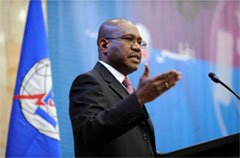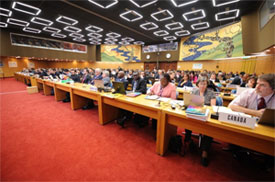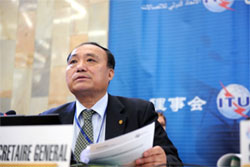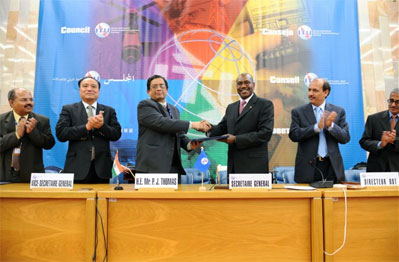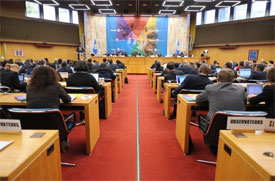|
Geneva, 20 October 2009 |
Not an official record |
N°1 |
||||||||
|
INAUGURAL PLENARY OF COUNCIL 2009 Ghana’s Minister of Communications sets the tone
as new Chairman of the ITU Council
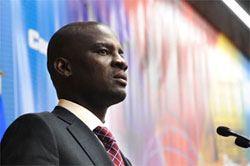 Ghana’s
Minister of Communications Haruna Iddrisu was elected Chairman of the
2009 session of the ITU Council. Opening the meeting, Mr Iddrisu
recalled that since joining ITU in 1957, Ghana had maintained an active
working relationship with the Union from which it had benefited
enormously, just like many other countries. Among the benefits the
minister cited are "the excellent team effort and expertise of the Union
in providing clear guidance for the accomplishment of an information and
knowledge society in the world". Ghana’s
Minister of Communications Haruna Iddrisu was elected Chairman of the
2009 session of the ITU Council. Opening the meeting, Mr Iddrisu
recalled that since joining ITU in 1957, Ghana had maintained an active
working relationship with the Union from which it had benefited
enormously, just like many other countries. Among the benefits the
minister cited are "the excellent team effort and expertise of the Union
in providing clear guidance for the accomplishment of an information and
knowledge society in the world".He paid special tribute to the outgoing Chairman Dr Plamen Vatchkov for the work done in the past year and wished him every success in his new role in the Government of Bulgaria. Mr Iddrisu then commended the Secretary-General and his team for the reforms that have contributed to raising ITU’s visibility today. Mr Iddrisu said he was humbled to be given the opportunity to chair this year’s session, that is set to "discuss issues of immense strategic importance for the Union," especially in the run-up to the Plenipotentiary Conference in Veracruz, Mexico, on 4–22 October 2010. Key challenges for the CouncilThe Council will decide on the biennial budget for 2010-2011. "We all want to see a balanced budget, even as we also desire to formulate innovative ways of encouraging and generating more savings to support developmental initiatives particularly to aid developing economies as part of our quest to bridge the digital divide among our nations," the Chairman commented. The Council will discuss and approve the Operational Plans of the General Secretariat and the three Bureaux. "Our task will be to ensure that through the implementation of the plans for the period 2010-2013 the global visibility of ITU will be further enhanced," said the Chairman. He underlined that the "aim must be to facilitate the delivery of activities that will be geared towards the deployment of telecommunications/ICT to improve upon the living conditions of all citizens irrespective of geographical locations. Particular attention would therefore have to be paid in our policy discussion to make ITU's Regional presence to be felt even more positively."
On the strategic management of the Union, Mr Iddrisu said "we also have a responsibility to ensure that we agree on steps to be taken to give to ourselves a harmonized Strategic Plan for 2012-2015 which will in turn lead to the harmonization of the Operational, Strategic and Financial Plan of the Union." To this end, he stressed the need for the Council "to ensure that the Union has an effective Human Resource Development Strategy and Plan in place. This plan should serve as a motivating tool to enhance staff productivity to support the elected team of officials to deliver their agenda of innovative change." He also called on "Management to put in place streamlined communication and consultation channels between Management and the Staff Council for their mutual benefit and that of the Union at all times." Underlining that the telecommunications/ICT sector is not immune to the global financial crisis, he said that ITU must "plan ahead to minimize the degree to which the financial crisis will affect the Union, the ICT industry as well as countries in these dramatic and uncertain times." On the issue of cybersecurity, Mr Iddrisu called on countries to work
in a collaborative manner to protect ICT networks from intrusion. "Such
collaborative discussion should also urge us to develop shared
understanding of open technical standards that will be beneficial to all
nations," he observed. And indeed, "it is only when we pursue the Global
Cybersecurity Agenda in such a collaborative manner that our fight for
online protection for children through ITU’s venture on the ‘Child
Online Protection’ initiative can be sustained." Turning to climate change, Mr Iddrisu called it "an abiding challenge of our generation", adding that "it affects every one of us and has negative impact on safe lives and food security as was affirmed at the World Climate Conference held here in Geneva last September". He invited councillors "to strategize to empower the Union to come out with an elaborate collaborative arrangement with other global bodies such as the World Meteorological Organization and make the impact of ITU felt in the upcoming global conference on the Climate Change in Copenhagen in December 2009." He added that "the Union should put in place a global strategy for the deployment of emergency telecommunications and other alerting systems in monitoring climate change". Furthermore, the reduction of emissions through the use of energy-efficient ICT devices, networks and applications, needs to be reinforced by ITU. For the Chairman, "these are areas of great importance and perhaps ITU might have to venture into more collaboration in the area of research as far as this subject matter is concerned so we can be proactive to the dangers of climate change." He concluded his statement by urging all councillors to "pledge to work together and support ITU."
A very busy and productive 2009 In his State of the Union address to the Council, ITU Secretary-General Hamadoun I. Touré described 2009 as a "very busy and productive year" marked "with the highly successful ITU Telecom World 2009 event". The event was attended by Heads of State and Government, more than 80 ministers, and over 400 chief executives. He underlined the uniqueness of this event, which had a really innovative Forum programme, where many key issues were discussed in depth, as well as the Youth Forum, which brought together some 300 young people from 150 countries around the world.
During Telecom World 2009, a plaque was unveiled to honour Russian radio pioneer, Alexander Popov, outside Room B of the ITU Tower building (where the Council is taking place). It is now the Popov Room. Thanking the Russian administration, for agreeing to refurbish the room, Dr Touré expressed the hope of "seeing other ITU rooms refurbished and renamed in honour of pioneers and giants in the field of telecommunications".
Dr Touré reported continued progress on the seven goals of ITU’s Strategic Plan for 2008-2011. In particular, he said, "we have succeeded in bringing ITU’s key messages to the top of the international agenda. Demonstrating that information and communication technologies are vital and beneficial in addressing each and every one of the global issues faced today, particularly in the key areas of climate change, cybersecurity, and the financial crisis — areas where ICT are now clearly recognized as being part of the solution not part of the problem". He noted that working methods continue to improve, with elimination
of paper wherever possible. "A good example is our new internal registry
project, which means we will no longer have to circulate paper copies of
correspondence" the Secretary-General said. "We are also increasingly
using virtual conferencing tools wherever possible." World Telecommunication Policy Forum 2009
WSIS Forum This event was successfully co-hosted with the United Nations Conference on Trade and Development (UNCTAD), the United Nations Educational, Scientific and Cultural Organization (UNESCO) and the United Nations Development Programme (UNDP). The WSIS Forum (formerly, the WSIS Cluster of events) was timed to coincide with the celebrations for World Telecommunication and Information Society Day, which this year focused on the theme of "Protecting Children in Cyberspace". Dr Touré said "we were honoured to have Queen Silvia of Sweden as our patron for the event, along with three laureates for their exceptional work in protecting children online: Brazil's President Luiz Inácio Lula da Silva; Robert Conway, CEO of GSMA, and Ms Deborah Taylor Tate, former Commissioner of the United States Federal Communications Commission."The three Sectors ITU’s Radiocommunication Sector (ITU-R), Telecommunication Standardization Sector (ITU-T) and Telecommunication Development Sector (ITU-D) have been busier than ever implementing the wishes of members, Dr Touré noted.
Apart from its regular ongoing work, preparatory activities also got under way in September with a preliminary meeting to prepare for the World Radiocommunication Conference, which will take place in Geneva on 23 January−17 February 2012, preceded by the Radiocommunication Assembly on 16−20 January. The September meeting was held in collaboration with the African Telecommunication Union (ATU). In addition to participants from ATU, the five other regional telecommunication organizations were represented: the Arab Spectrum Management Group (ASMG); the Asia-Pacific Telecommunity (APT); the European Conference of Postal and Telecommunications Administrations (CEPT); the Inter-American Telecommunication Commission (CITEL), and the Regional Commonwealth in the Field of Communications (RCC).ITU-T The Sector has focused this year on the follow-up to the World Telecommunication Standardization Assembly 2008. A recent meeting brought together chief technical officers from around the world who underlined ITU’s pre-eminent role in standardization. This Sector's "high profile achievements include the methodology to give ICT companies a consistent way to report their carbon footprints; home networking standards under the banner g.hn; and key standards in identity management, IPTV and optical networks," the Secretary-General said. ITU-D In addition to its regular programmes and providing direct country assistance, ITU-D undertook a number of initiatives this year to connect the unconnected, including rural projects endorsed at the Pacific Ministerial Forum in February and wireless broadband projects in Africa resulting from the Connect Africa event in Rwanda in 2007. Dr Touré recalled that during ITU Telecom World 2009, BDT launched the "Connect a School, Connect a Community" initiative with the United Nations Secretary-General Ban Ki-moon. BDT has also begun practical cybersecurity training activities for members as part of the IMPACT partnership. It was also able to provide emergency telecommunication assistance during disasters, along with the support of partners. In addition, preparations are well under way for the World Telecommunication Development Conference in 2010.
ITU is now playing "a more dynamic role as a United Nations organization", said the Secretary-General. It is taking part in many high-level UN meetings and playing an active and important role in the run-up to the United Nations Conference on Climate Change in Copenhagen in December 2009. Highlighting these developments, Dr Touré said "we have also seen much stronger participation in ITU activities by the heads of other UN agencies during the year". He announced the opening of ITU’s Liaison Office with the United Nations in New York, with Gary Fowlie as its head. This, he said, would "allow us to remain tightly integrated within the UN system". Coming soon: Global Symposium for Regulators and Global Industry Leaders Forum The 9th Global Symposium for Regulators (GSR) will take place on 10-12 November in Beirut, Lebanon, preceded on 9 November by the Global Industry Leaders Forum (GILF) in the same venue. Under the theme "Hands On or Hands Off?", GSR will address the challenges of convergence and the changing role of the regulator. And the Connect the Commonwealth of Independent States (CIS) Summit will take place from 26-27 November, in Minsk, Belarus, providing an opportunity to highlight the huge market potential of the region and its growing importance as a major ICT development hub, particularly in the area of software innovation.
Funding of the Union, its federal structure and proposals for the Plenipotentiary Conference in 2010
To create a more stable and predictable environment, the Secretary-General gave the example that for any changes in the number of contributory units, there should be a notice period of at least a year before the Plenipotentiary Conference. Addressing the budget, Dr Touré stated that "we have been working on zero nominal growth for over ten years now, and have not even taken inflation into account. While we have done a good job, our successors will find the next budget cycles very difficult if we do not at least match inflation." Dr Touré also made reference to the International Public Sector Accounting Standards (IPSAS), which the United Nations system is implementing, calling it a "major undertaking for any organization". But at the same time he also noted that IPSAS would make our financial statements more transparent and easier to understand, and that it would facilitate a move to full results-based budgeting and results-based management. ITU, he said, is committed to meeting the original deadline for implementation of IPSAS by 1 January 2010. He added that "if ITU is successful, it will be among the first agencies to actually keep to that deadline, as others are now postponing the implementation date to 2012". Turning to the federal structure of ITU, Dr Touré noted that it has been working well over the past three years. However, he pointed to the need to "change the titles of the directors to reflect their elected status and match their real position within the UN system". He suggested that they should be designated as Assistant Secretaries-General, rather than Directors. He would welcome the Council’s feedback on this suggestion. "This principle already exists within other organizations, and I believe would help clarify the importance of the elected officials of the Bureaux" , the Secretary-General commented.There will also be a need to streamline the ITU Constitution and Convention as much as possible, Dr Touré noted. "Of course we must retain the indisputable principles - without these we are nothing - but there is room to avoid unnecessary debate and to make them leaner and fitter for the modern world." Staff as the lifeblood of the Union Dr Touré expressed his pride in "leading such a strong organization and such dedicated staff – in all three Sectors and in the General Secretariat." The staff, he said, "are the lifeblood of the Union, and without them, and their commitment and enthusiasm, we would simply not exist." Looking ahead, Dr Touré said "It is true, perhaps that the relationship with the Staff Council has not been as positive as I would have liked over the past few months. But I am confident that better times lie ahead and that by joint cooperation we will succeed in rebuilding any bridges that may have fallen into disrepair." Annual Report of Activities of the Union (Document 35 and its Addendum 1) This report was presented by ITU Deputy Secretary-General Houlin Zhao, with additional input from the Director of ITU’s Telecommunication Development Bureau, Sami Al Basheer Al Morshid and the Director of ITU’s Telecommunication Standardization Bureau, Malcolm Johnson on their main activities. Mr Johnson commented that ITU-T has been very busy implementing the 49 Resolution from the World Telecommunication Standardization Assembly (WTSA-08) that took place in Johannesburg, South Africa, in October last year. "Participation in our meetings has been increasing, despite the economic crisis and swine flu," Mr Johnson said. He added that last week a study group approved a standard for a universal charger... so hopefully, carrying different chargers around may soon be a thing of the past.
In addition to supporting the US
view, Germany, raised the issue of the link between the three reports
brought before the Council: the Annual Report on the Activities of the
Union, the Progress Report on implementation of the strategic plan and
the Corporate Annual Report. India to host World Telecommunication Development Conference in 2010 The next ITU
World Telecommunication Development Conference (WTDC-10)
will take place in Hyderabad, India, on 24 May - 4 June 2010. Just
before the lunch break, the host country agreement was signed by ITU
Secretary-General Hamadoun Touré and P.J. Thomas, Secretary, Department
of Telecommunications, Government of India.
FIRST PLENARY MEETING Use of hyperlinks in online ITU documents (Document 36)Paperless working methods have led to the increasingly frequent use of hyperlinks in documents used by the Council and other ITU executive or policy-making organs. This has many advantages, but also poses legal questions. During the 2008 session of the Council, the United States requested a legal opinion on the status of hyperlinks in the documents of the Union. Arnaud Guillot, Head of the Legal Affairs Unit, presented the response to this request as outlined in Document 36. Legal issues He explained that use of hyperlinks is only appropriate when all decision-making participants at a meeting have equivalent and reliable access to the necessary computers and networks, and thus relevant information. No valid decision can be taken if not all members can see the material during the decision-making process. An internal hyperlink to another document must not result in the implicit approval of the target text. With external hyperlinks to websites outside ITU, their content and validity cannot be verified; the target text could become obsolete, modified or taken offline without the Union being informed. There are also concerns over intellectual property and copyright. It is not clear whether, before establishing any type of hyperlink, authorization needs to be sought from the owner of the site. Other United Nations and similar organizations have indicated that their use of hyperlinks remains very limited in official documents put forward for consideration by executive bodies. The US councillor noted that the issue is "not yet fully embraced by the UN system, but will become increasingly important". South Africa stressed that, in paying regard to intellectual property rights, ITU should not lose sight of the essential use of hyperlinks in disseminating information effectively. The Council duly noted the document and agreed to follow the recommendations it contains (see below), pending studies on the issue by the UN system as a whole. It will examine the implementation of these recommendations at a future session. Mr Guillot commented that "it is worth pointing out that these recommendations and best practice are not intended to apply to the activities of study groups".
Progress report on 2008-2011 Strategic Plan for ITU (Documents 21 and 22) describes the activities undertaken by all Sectors to achieve ITU’s strategic goals since the 2008 Session of the Council, from November 2008 to July 2009, and was introduced by the Head of the Corporate Strategy Division (CSD) of the Strategic Planning and Membership Department (SPM). It was supplemented by Document 22, which describes progress on the implementation of the ITU framework for performance measurement and reporting in regard to achievement of the ITU strategic goals, including a reference to examples of performance measurement in the Union. Councillors highlighted the advance made by the Secretariat in simplifying the way performance is measured and reported, and requested for this effort to be continued in the definition of the next Strategic Plan and Financial Plan for the Union. After these considerations, Documents 21 and 22 were endorsed. Elaboration of the strategic plan and financial plan of the Union for 2012-2015 (Document 26) The Head of CSD presented a draft resolution for the creation of an ad-hoc Council Working Group (CWG) for the elaboration of the draft ITU Strategic Plan and Financial Plan for 2012-2015. This document included a list of materials for the consideration of the CWG. Councillors pointed out the importance of establishing this group and suggested co-locating its meetings in line with other CWGs. This would allow a more efficient use of resources and ensure the linkage of the new group with the outcomes of other CWGs. Councillors also highlighted the importance of continuing the current effort to simplify and align the strategic, financial and operational plans. Regarding the materials to be considered in the elaboration of the draft Strategic and Financial Plans, councillors requested that further materials be added for consideration by the CWG. A key issue of discussion was the calendar for WTDC-10 in relation to the 2010 Session of the Council. In order to ensure the inclusion of the strategic planning for ITU-D, which will be defined during WTDC-10, the 2010 Council session might need to extend the working period of the CWG beyond April 2010. After these considerations, document 26 was endorsed and the creation
of the CWG was approved. Italy’s delegate Fabio Bigi was appointed as
its chairman, while Alexander Ntoko, Head of CSD, was appointed as
secretary. The first two meetings will take place on 21 and 27 October
2009. The report summarizes the main results of the Working Group on the World Summit on the Information Society (WG-WSIS) since last year. It was introduced by the group’s chairman Vladimir Minkin (Russian Federation). As well as information reports from the ITU Sectors, the group considered various documents, including a Draft Roadmap for ITU’s Activities in the Implementation of WSIS Action Lines up to 2015. The Working Group agreed to invite the Council to consider the following proposals:
The Group also agreed:
Regarding proposals 1-4 above, several councillors pointed to the need to make clear that this refers only to activities within ITU’s competence — not all WSIS follow-up under UNGIS. Duplication of work should be avoided. Canada said attention needs also to be paid to the impact on ITU’s budget. BDT Director Sami Al Basheer Al Morshid assured the Council that activities are consolidated under the Operational Plan, and care is taken not to duplicate. The Council accepted the proposed roadmap for ITU’s implementation of
WSIS activities, as well as the working group’s other proposals, having
noted the need to refer to financial implications. This was a contribution from the Russian Federation, also introduced by Professor Minkin. It recommends that ITU’s proposed roadmaps for implementing WSIS Action Lines C2 and C5 be sent to PP-10, and that roadmaps should be established for other WSIS Action Lines in a similar way, for consideration by the plenipotentiary conference and integration into a single roadmap.The document was endorsed by the Council. Report from Chairman of the Dedicated Group on Internet-Related Public Policy Issues (Document 52A1) The Dedicated Group was established under WG-WSIS, and first met in February 2009. Its job is to (a) identify and study matters related to international Internet-related public policy issues; (b) disseminate its outputs to ITU’s membership, and (c) contribute to the related work of WG-WSIS. The group has met twice. Based on contributions submitted to the Dedicated Group, a table was compiled (as Annex 1) listing the relevant ITU mandates for work on Internet matters, in terms of Resolutions, programmes, and Study Groups. Additional details were provided regarding the mandates and activities of the General Secretariat, ITU-T, and ITU-D. It was agreed to request the ITU General Secretariat to study those activities that are already under way regarding development of the future Internet, in order to:
The Council noted the document. This was a contribution from Brazil. It states that "the role of governments in playing their rightful role in matters related to the elaboration of international Internet-related public policies is not sufficiently represented in current arrangements and mechanisms for Internet Governance." It says that ITU has the mandate of providing a forum that can give governments an equal role in these matters, and specifically the ITU Council. A draft Resolution refers to previous decisions by WTSA, WTPF and WTDC, and particularly the Tunis Agenda resulting from WSIS. It invites ITU Member States to endorse the scope of work of ITU on international Internet-related public policy matters, represented by a list of topics given in an Annex. It instructs the Secretary-General: "1. To provide the necessary support, within existing budgetary resources, to ensure that the Dedicated Group on international Internet-related public policy matters carries out successfully its work; 2. To disseminate, as appropriate, any relevant outcomes of the Dedicated Group on international Internet-related public policy matters to all relevant international organizations and stakeholders actively involved in such matters for their consideration in their policy making process; 3. To report annually to the Council on activities undertaken on these subjects and to submit proposals as appropriate." The Council expressed appreciation of Brazil’s contribution, but there was much discussion of its implications. The United States and others, for example, said information should be added to the Annex on activities by other international bodies. Also, it should be clarified that the group comes under the Council Working Group on WSIS, and should report its conclusions there, before they are passed on to the Council. Saudi Arabia, in contrast, stressed that, because it involves only government representatives, the Dedicated Group needs to be independent of the WSIS group, and should be free to consider any relevant matter, not only those listed in the Annex. For developing countries, the emphasis should be placed on promoting participation in Internet-related matters, said Ghana. It was proposed by the Chairman that an Ad Hoc group (chaired by
Brazil) be set up to consider the issues on Wednesday morning (21
October), and report back to the Council. The document was presented by Alexander Ntoko (General Secretariat). The report describes ITU’s activities related to Plenipotentiary Conference Resolution 101: "Internet Protocol-based Networks"; Resolution 102: "ITU’s role with regard to international public policy issues pertaining to the Internet and the management of Internet resources, including domain names and addresses"; and Resolution 133: "Roles of administrations of Member States in the management of Internationalized (multilingual) domain names. During discussions, the Council expressed appreciation for ITU’s (and especially BDT’s) role in capacity building. The Council noted the activities in this report. |
||||||||||

